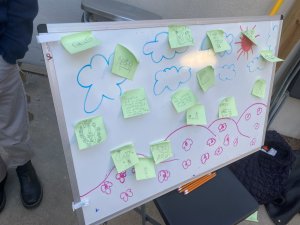What does it mean to create our collective future (olam habah)? This week when diving into good choices and personal responsibility we considered what it means to create our best future. We thought about what we want the future to look like, and how we could approach working toward that future.

As we sat around the yard at Makom students crunched on their snacks and pondered big questions.
I asked: in a perfect world, what would you spend most of your time doing? Everyone reflected on what their perfect world’s would entail with pencil to paper as a thoughtful silence set in. One by one we added our sticky note contributions to the Olam Haba scene sketched on the whiteboard.

In our Olam Haba (world to come/ perfect world) we would:
- Play Minecraft.
- Not worry about COVID-19.
- Sleep/Live with a different friend every weekend, and live with family on the weekdays.
- See a rainbow everyday.
- See trees and birds making bird sounds.
- See flowers.
- Be with my dog who passed away.
- Eat candy whenever I want.
We transitioned into reading Pirkei Avot, and the learners had some questions.
“Someone who knows a lot of Torah and good deeds but chooses to embarrass a friend is not helping to create a better future (Olam Habah).” Pirkei Avot 3:11

One learner piped up: “What does embarrassment mean?”
We went around and many kiddos eagerly shared examples of embarrassment.
“When you are in class and everyone remembered their homework but you didn’t and you are the only one, that’s embarrassing ,” another learner explained.
We spoke about the sensations that come along with embarrassment. I shared that when I am embarrassed I feel a pit in my stomach.
“What does knowing Torah have to do with embarrassing a friend?” Another insightful kiddo inquired.
“Good deeds and embarrassment are opposite, but opposites still share a connection” their neighbor replied.
Another learner chimed in, “we should feel good when we are sharing Torah!”

Students agreed, a perfect world would not involve embarrassing a friend. In the future we want to see, we would always be able to do the right thing. We considered the times when folks know what the right thing is but choose not to do the right thing. Everyone reflected on what we would need in order to create this perfect world where people always did the right thing.
One insightful kiddo shared: “If you were trapped in your house and didn’t have keys you could not leave, that would stop you from doing the right thing.”

We concluded that having the proper tools is an integral part of doing the right thing. Sometimes those tools are emotional tools. How can we support ourselves when we feel dysregulated? We can’t do the right thing if we are not emotionally prepared. Other times these tools are physical tools. When do we have access to food, car keys, money, and information so we can go into the world prepared to do the right thing?
Students spoke about other barriers we might face when attempting to do the right thing.
Another sensitive kiddo explained, “you might know the right thing and want to vote for the right thing but get pressured to do the wrong thing if you share what you are voting for.”
We acknowledged that everyone’s truth is not always the same. Having differing perspectives on what the right thing is can cause tension.
The ideas your children bring to our learning are constantly impressive.

We are wrapping up unit one, which has been about how the practice of loving our neighbors shapes our relationships with ourselves, each other, and our world. Next week, we look forward to considering different kinds of love and when love is conditional or unconditional.
